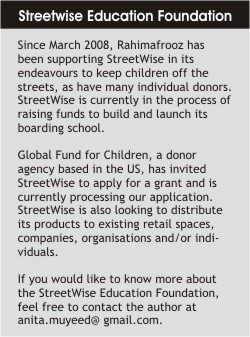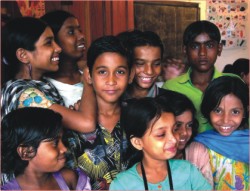
Inside
|
Anita Aparna Muyeed suggests that we think of the nation's street children as invisible assets Much research has been conducted in the area of education, and it has become common knowledge that the economic future of nations depends in part on their ability to remain at the front-line of social, scientific, and technological breakthroughs. With education and training, citizens develop themselves to meet new career challenges. Education reduces poverty and curtails unemployment. There is a notable relationship between education and reducing crime. A clear connection also exists between education and public health. Education helps to sustain and extend valuable social and cultural traditions and boosts the economic well-being of women. Education is a major endowment to economic growth. Quality education is an investment in human capital, and like any other economic capital, it directly impacts economic growth. In a country like Bangladesh, with a population of approximately 150 million people, we have a formidable asset in this regard. Investing in our people, as human capital, is as advantageous as fostering economic development and growth via investments in physical plants and technology.
In light of this information, consider that over 35% of the population of Bangladesh consists of children. According to various sources, anywhere from half a million up to two million among them live on the streets and 75% of these children live on the streets of Dhaka alone and have a very bleak chance of obtaining access to any form of education, let alone basic social services. Children need to eat. They need shelter, protection, education and health services. The children of today are the bearers of our future. They are valuable assets. If we do not provide them with basic support systems essential to child development, we are compromising the society of tomorrow. This is a simple and powerful fact.
Moreover, children on the streets are vulnerable to many types of danger, including sexual predators, pimps, and persons engaged in criminal activities. An increasing number of children are being pushed into petty crimes, begging, or prostitution. Many children use drugs and alcohol to cope with hunger, fear, and other realities of life on the streets. Children on the streets are victims of police beatings, bribe extractions and harassment on a regular basis. They are arrested and detained unlawfully by the police and are often sexually abused. Street children are exposed to dangerous and unhealthy conditions and suffer from a variety of illnesses. Fever is the most common of them all. Other common illnesses among this group of children include accident injury, jaundice, chicken pox, allergies, measles, asthma, and diarrhoea.
In Bangladesh, waterborne diseases such as typhoid and intestinal worms, target many more children on the streets and leave them malnourished and too weak for school. Although children on the streets deem food to be higher in importance than education and will spend the majority, if not all of their earning on meals, they suffer from malnutrition. Nutritional deficiencies are high among children living on the streets including vitamin A, iodine and iron deficiency, causing lower resistance to infections, anaemia, night blindness, increasing morbidity and the impairment of physical and mental development (Ghuznavi, Ghuznavi et. al 2001).
First, we fail to see that in order for children living on the streets to receive the education that we impart to them, we need to provide them with a complete life support system alongside it. Without shelter, protection, nutrition and health services, education is not possible. Children living on the streets need boarding facilities and comprehensive services. Secondly, we choose to offer them basic education models that do not allow them to entirely break away from poverty and/or discrimination. If we truly invest in our children, i.e. commit ourselves to transform their lives through education and understand the unstable and often transient nature of their environment, we realise that it is impossible to retain such students in any institution on a long-term basis unless we provide them with ancillary support services. To reiterate, we realise that we need to invest more in street children (in comparison to mainstream children) in order to keep them off the streets and into schools. If we can foresee the return on investment in such endeavours, and have already committed in investing as much, why then, must we continue providing them with the mediocre education that we have been offering alongside this deliberate effort? Why not go a few steps farther and offer them the best education the nation has to offer, not basic, not conventional, but of the highest calibre?The issue here, I believe, is about confronting stereotypes and perhaps also overcoming notions that only the privileged should have access to "privileged schools." If we can get through this psychological hurdle, we would realise that it makes a whole lot of sense. These are the children without shelter, without mentors, without access to health services and food; these are the children that need the access to the best schools, not the other way around. These children are the unrecognised assets of our nation, waiting to be cultivated. Lastly, in conjunction with the much needed life support system and the need for a high calibre of education, we need to provide an adult program for the students' guardians. If the mothers can be provided with the basic support and the tools to become financially and socially independent, the children benefit the most as they are granted a secure passage through such schools. Adult programs are critical to ensure the viability of any educational endeavour amongst this cohort of youth.
A "Privileged School" for the Underprivileged The StreetWise Project started off in 2006 with 10 children living on the streets who met for lunch, art, and playtime every Friday. After a year of getting to know the children and their families, in January 2007, StreetWise rented a space in the heart of the children's neighborhood in Badda. StreetWise is an alternative education program that helps children stay off the streets. It empowers its students through education, art, and the knowledge and the tools to break free from the dangers of the streets and the slums. Today, the Badda Pilot hosts 30 children, meets five days a week and offers its students breakfast, lunch, Bangla, English, ESL, Math, health & hygiene, religion, art & crafts, story-telling, coaching, games, and healthy kitchen & cooking, theatre, song & dance, and an array of other activities. The children at StreetWise all faced illiteracy when they were invited to the program in January 2006. Some guardians, at one point or another, had previously enrolled them in local schools, only to have them rejected by the system or had pulled them out themselves. At StreetWise, the children are staying. They are learning how to read and write and much more. StreetWise approaches education as a creative and interactive process. Our volunteer instructors are dedicated and skilled. In the past year and a half, StreetWise has attracted volunteers from different parts of the world to come and share their knowledge and skills with its students and teachers. The children lacked proper shelter and mentoring. Now they have a place where they are looked after, cared for and educated. School starts at 8am and ends at 5pm. On a rotation basis, every night, three students are chosen to spend the night at school. The time they spend in school is valuable time that not only keeps them off the streets but teaches them how to stay out of trouble. The children faced poor health and nutrition. They now have access to medical care and treatment, daily vitamins and have two meals a day. On a rotation basis, the children that stay overnight have three meals a day.
Importance of Art One of my students, aged 8, was unquestionably depressed for several days and I just couldn't get him to tell me why. A few days later, in art class he drew a drawing of a terrified child being hurled across the street by a monster. This finally gave me an opening to approach him and ask him more about the drawing. It turns out he had been beaten by the police and detained at the police station overnight and had been acutely traumatised by the experience. Through art, he was finally able to speak about it and begin the healing process. I have taught art in various settings in the past, and I know first-hand that it serves as a bridge between cultures and socioeconomic barriers. It is a valuable means of communication and expression between the artist's world and the one outside. Art is crucial, as it can serve as a form of therapy without the stigma. As an example, the use of art therapy both for assessment and therapy of abandoned children in Kiev, Ukraine was noted by Arrington & Yorgin (2001), and Lowry (1995) showed how art can be used to capture the imagination of street children and guide them away from substance abuse. Similar results were found at the "Neighborhood Place at Junta" in New Haven, Connecticut, where I spent my evenings as an art instructor alongside my job at the Yale University Child Study Center from 2000 to 2003. The after-school arts program, called the Neighborhood Place (a program launched in collaboration with the Yale Child Study Center) provides disadvantaged children in New Haven an opportunity to study art and channel their energies in positive ways and prevent mental health problems. Most of the children I taught in New Haven were delinquent children. Through art, my goal was to help each child individually and provide counseling when needed. Art can also help others understand issues surrounding mental health and can aid recovery. The art produced at StreetWise works in many other interesting ways. Our art class not only gives our students a voice, the much needed creative release, and its therapeutic benefits, it also gives them financial independence from their guardians and an open door to education. A Simple Solution In light of this, the program had to find a way for our students to continue providing for their families while they were getting an education. The solution was very close at hand its source was in the art program. We decided to launch the StreetWise product. Each StreetWise product for sale has one thing in common, whether a T-shirt, a poster or a lamp, it bears a reproduction of its students' artwork from art class. The reason behind our choice of producing "printed artwork" is that it can be reproduced in large numbers. Instead of each child having to spend endless hours creating a handful of art products, the print reproductions maximise the value of each piece of art. The time saved, and the supplemental return in funds, not only allows the students time to get an education, it also enables them to provide for their families and generate income for running the school. All this, simply as a by-product of art class. StreetWise makes sure that its students first priority is getting an education. We don't believe in running a sweat-shop at the expense of education. Fifty percent of the profits drives the school forward, and the rest is distributed to the children and their guardians. With the income that the children bring in from school, the parents are no longer hindering them from attending classes. And as children actually "earn" their stay in the program, they are no longer receivers of charity. This makes a big difference in the level of responsibility and pride that the students bear towards the program and adds to its success. This revenue model also allows our school to be self-sustaining one, which allows for more autonomy and flexibility. Moreover, we have begun chalking out an adult program. The students' guardians collect profits from the sales of StreetWise products, medical attention when required, and have come to use StreetWise as a drop-in centre when in need of advice. StreetWise has successfully rebuilt Shahara's home after it was burnt to ashes a few months ago. Boarding School The core strength of this boarding school lies within its philosophy of providing not only a comprehensive educational system, but also a complete life-support system for children living on the streets. We intend to grow organically as a self-sustaining, eco-friendly micro-community and preserve a self-sustainable revenue model. Moreover, we aim to offer the highest calibre of education and support to our students through highly accomplished and selective educationists and staff. The StreetWise boarding school will place a strong emphasis on the mastery of the English language, as it is a universal language with many benefits. Without proficiency in English, our children will not be competitive in the job market and will not be able to acquire jobs with growth potential. Our courses will be designed to prepare students to perform job and life tasks successfully. In order for any educational institution to survive in the new millennium, it is imperative that its students have adequate software training. We intend to place strong emphasis particularly on IT and Computers. Computers are best introduced when children are very young and are key to lucrative careers. Through our software training initiatives, we will make a definitive commitment to our students' future growth and success. Anita Aparna Muyeed is the Executive Director of StreetWise. |
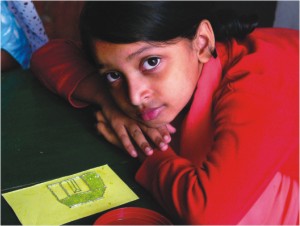 Time to Get Streetwise
Time to Get Streetwise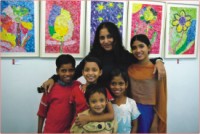 Although much research conducted thus far has focused on post-secondary education and its social and economic effects, researchers are now pivoting the spotlight towards pre-school education and its impact on society at large. Not surprisingly, the results show that because 90% of brain development takes place prior to age 6, early education has the highest return of any investments in human capital.
Although much research conducted thus far has focused on post-secondary education and its social and economic effects, researchers are now pivoting the spotlight towards pre-school education and its impact on society at large. Not surprisingly, the results show that because 90% of brain development takes place prior to age 6, early education has the highest return of any investments in human capital.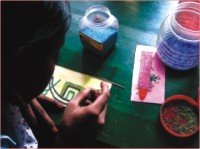 Children Living on the Streets
Children Living on the Streets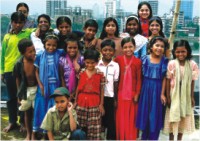 Children's lives are at risk without safe water to drink. Their lives are further endangered by lack of hygiene and sanitation. The consequences of this shortfall are dreadful and costly. According to a USAID publication, diarrhoea is the second highest killer of children in the world, taking about 4,500 lives each day.
Children's lives are at risk without safe water to drink. Their lives are further endangered by lack of hygiene and sanitation. The consequences of this shortfall are dreadful and costly. According to a USAID publication, diarrhoea is the second highest killer of children in the world, taking about 4,500 lives each day. 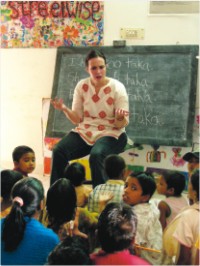 Why Do We Falter?
Why Do We Falter?